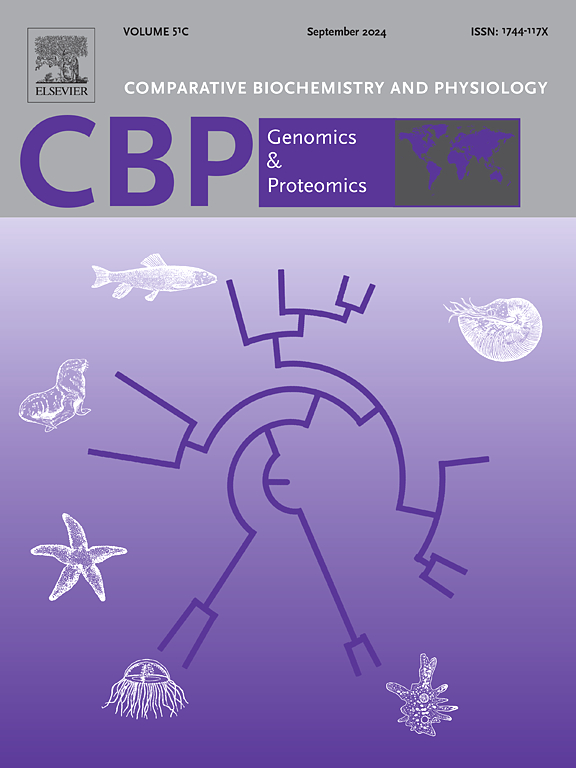雄性狐猴(双翅目:狐猴科)对寄主植物挥发物性刺激的转录组反应
IF 2.2
2区 生物学
Q4 BIOCHEMISTRY & MOLECULAR BIOLOGY
Comparative Biochemistry and Physiology D-Genomics & Proteomics
Pub Date : 2025-03-26
DOI:10.1016/j.cbd.2025.101495
引用次数: 0
摘要
褐霉是南美洲主要的水果害虫。先前的研究表明,接触番石榴挥发物(可能是番石榴的祖先宿主)的雄性会加强求偶行为,提高交配成功率。然而,这种作用的分子和生理机制尚不清楚。在这里,我们通过从头转录组组装和差异表达分析来探讨暴露于番石榴精油挥发物对成年男性头部基因表达谱的影响。我们发现678个差异表达基因(FDR <;0.05和|FC| >;2),暴露者308例,未暴露者370例。暴露处理影响了参与黏液形成、脂质代谢和神经肽加工的基因的转录。我们的研究结果首次揭示了寄主果实挥发物引发雄性拟南芥性刺激的分子机制。本文章由计算机程序翻译,如有差异,请以英文原文为准。

Transcriptomic response of male Anastrepha fraterculus (Diptera: Tephritidae) to sexual stimulation by host plant volatiles
Anastrepha fraterculus is a major pest of fruits in South America. Previous studies revealed that males exposed to volatiles from guava, a likely ancestral host, intensify courtship behavior and increase mating success. However, the molecular and physiological mechanisms underlying this effect remain unknown. Here, we explore the impact of exposure to guava essential oil volatiles on the gene expression profile of adult male heads through de novo transcriptome assembly and differential expression analysis. We found 678 differentially expressed genes (FDR < 0.05 and |FC| > 2), 308 of which were over-expressed in exposed males and 370 in non-exposed males. The exposure treatment affected the transcription of genes putatively involved in mucus-forming, lipid metabolism and neuropeptide processing. Our findings provide the first insights into the molecular mechanisms underlying sexual stimulation in A. fraterculus males triggered by host fruit volatiles.
求助全文
通过发布文献求助,成功后即可免费获取论文全文。
去求助
来源期刊
CiteScore
5.10
自引率
3.30%
发文量
69
审稿时长
33 days
期刊介绍:
Comparative Biochemistry & Physiology (CBP) publishes papers in comparative, environmental and evolutionary physiology.
Part D: Genomics and Proteomics (CBPD), focuses on “omics” approaches to physiology, including comparative and functional genomics, metagenomics, transcriptomics, proteomics, metabolomics, and lipidomics. Most studies employ “omics” and/or system biology to test specific hypotheses about molecular and biochemical mechanisms underlying physiological responses to the environment. We encourage papers that address fundamental questions in comparative physiology and biochemistry rather than studies with a focus that is purely technical, methodological or descriptive in nature.

 求助内容:
求助内容: 应助结果提醒方式:
应助结果提醒方式:


